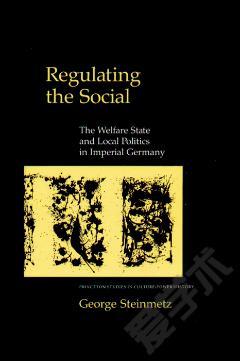Regulating the Social —— The Welfare State and Local Politics in Imperial Germany
----- 规范社会:帝国德国的福利国家与地方政治
Why does the welfare state develop so unevenly across countries, regions and localities? What accounts for the exclusions and disciplinary features of social programmes? How are elite and popular conceptions of social reality related to welfare policies? George Steinmetz approaches these and other issues by exploring the complex origins and development of local and national social policies in 19th-century Germany. Generally regarded as the birthplace of the modern welfare state, Germany experimented with a wide variety of social programmes before 1914, including the national social insurance legislation of the 1880s, the "Elberfeld" system of poor relief, and modern forms of social work. Looking at changes in welfare policy over the course of the 19th century, differences between state and municipal interventions, and variations in policy, Steinmetz develops an account that focuses on the specific constraints on local and national policy-makers. Whereas certain aspects of the pre-1914 welfare state reinforced social divisions and even foreshadowed aspects of the Nazi regime, other dimensions actually helped to relieve sickness, poverty and unemployment. Steinmetz explores the conditions that led to both the positive and the objectionable features of social policy.
{{comment.content}}








 京公网安备 11010802027623号
京公网安备 11010802027623号